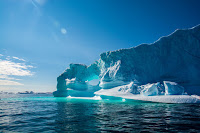Southwest part of the island could be major contributor to sea level rise.
Greenland is melting faster than scientists previously thought--and will likely lead to faster sea level rise--thanks to the continued, accelerating warming of the Earth's atmosphere, a new study has found.
Scientists concerned about sea level rise have long focused on Greenland's southeast and northwest regions, where large glaciers stream iceberg-sized chunks of ice into the Atlantic Ocean. Those chunks float away, eventually melting. But a new study published Jan. 21 in the Proceedings of the National Academy of Sciences found that the largest sustained ice loss from early 2003 to mid-2013 came from Greenland's southwest region, which is mostly devoid of large glaciers.
"Whatever this was, it couldn't be explained by glaciers, because there aren't many there," said Michael Bevis, lead author of the paper, Ohio Eminent Scholar and a professor of geodynamics at The Ohio State University. "It had to be the surface mass--the ice was melting inland from the coastline."
That melting, which Bevis and his co-authors believe is largely caused by global warming, means that in the southwestern part of Greenland, growing rivers of water are streaming into the ocean during summer. The key finding from their study: Southwest Greenland, which previously had not been considered a serious threat, will likely become a major future contributor to sea level rise.
"We knew we had one big problem with increasing rates of ice discharge by some large outlet glaciers," he said. "But now we recognize a second serious problem: Increasingly, large amounts of ice mass are going to leave as meltwater, as rivers that flow into the sea."
The findings could have serious implications for coastal U.S. cities, including New York and Miami, as well as island nations that are particularly vulnerable to rising sea levels.
And there is no turning back, Bevis said.
"The only thing we can do is adapt and mitigate further global warming--it's too late for there to be no effect," he said. "This is going to cause additional sea level rise. We are watching the ice sheet hit a tipping point."
Read more at Greenland Ice Melting Four Times Faster than in 2003, Study Finds

No comments:
Post a Comment